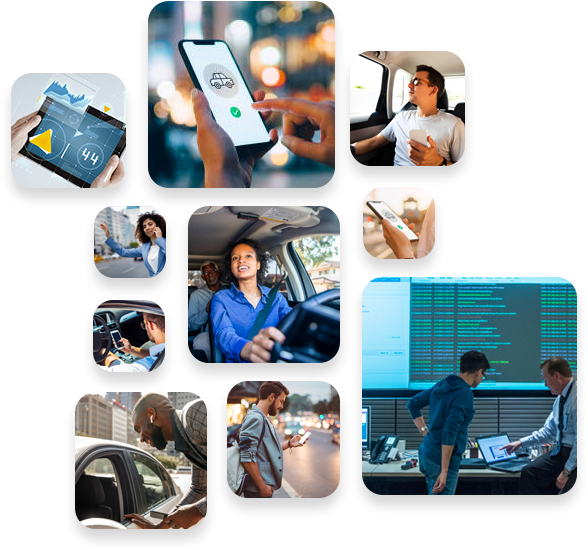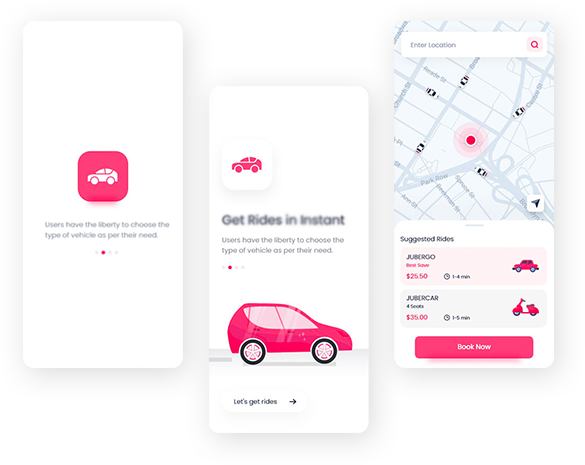Taxi applications have become an indispensable transport facilitator for travelers and daily commuters. From corporations to startups, businesses are adopting taxi-based solutions to manage the fleet better and to offer convenience to a customer/employee.

The demand for taxi apps can be learned from Statista’s latest report. According to it, the ride-hailing market will hit the $125,521 million mark by 2025 with an excess of 16.5 percent of CAGR from 2018 to 2025.
Adopting a taxi application widens the service bandwidth of a taxi business and ensures quick transportation service to users. With a taxi application, businesses can manage vehicles, schedule jobs, monitor the performance of drivers, optimize route/fuel consumption and analyze other KPIs.
While taxi app development is a highly profitable business avenue, it is challenging as well. To succeed in taxi application development, firms should keep a note of the project scope, app functionalities, monetization model, design considerations, tech stack, and various other factors.
Major Considerations For Taxi App Development
1. Target Audience, Project Scope and Goals
It is important to understand business goals and analyze project scope to devise a solution around it. Competitor analysis can help businesses in finalizing app features and choose a revenue model.
Moreover, an understanding of the target audience and its needs is crucial to building the right solution. If the target audience is a corporate organization, developing a corporate taxi solution that helps in collaborating with multiple firms for cab services will be an advantage.
2. Partnering With the Right App Development Company
Hiring the right taxi app developers is crucial to your project’s success. For hiring a taxi booking app development company, businesses can review a firm’s previous projects or testimonials and interview developers. By interviewing developers, firms can get a sense of their knowledge and approach to the project.
For selecting a taxi app developer, one can consider partners in the USA or Asia-Pacific as technology partners are clustered in these regions. With more competition around, businesses can easily select the most cost-effective yet experienced partner for their project.
3. Right Technology Stack
Selecting the right tech stack is crucial for app performance. While developing a taxi application, businesses must ensure their development partner is using the best tech stack for the project. Some tech considerations include:
a)- SMS, Voice and Phone verification: Nexmo, Twilio
b)- Database-MongoDB, PostgreSQL
c)- Push Notifications: Twilio Push.io
d)- Clouds- AWS, Azure, Google
e)- Payments- Stripe, Braintree, PayPal
f)- Analytics- Big Data, Apache, IBM, Hadoop
g)- Platform: Android, iOS, Web
4. App Monetization Model
To turn a taxi application into a profitable business, app owners can work on the following monetization methods:
a)- Service Fees: The passengers can be charged for a flat booking fee. An additional fee could be charged for security and other crucial services.
b)- Cancellation Fees: App owners can also think of adding cancellation fees in the case of delayed booking cancellation from the customer’s end.
c)- Third-party promotions: Cab businesses can collaborate with brands and receive good sponsorship/payment. They can parallelly extend users the earned benefits in the form of coupons and gifts that will help them in building market differentiators.
d)- Advertising: Taxi businesses can also allow in-app advertisement for which they can charge on a cost-per-click/inquiry basis.
Features to Incorporate in a Taxi Booking Application
A taxi sharing application has three main components namely — driver app, admin panel, and passenger app. Functionality selection should strictly be based on your app model, business goals, and target audience.
Below are important features worth considering:
1. Passenger App Features
The passenger-based application should have a user-friendly and easily navigable interface. Some of the features that businesses should incorporate in the app are user registration, profile management, scheduled taxi booking, fare calculation, driver tracking, travel history, payment, messaging, driver rating and review, and online customer support.
2. Driver App Features
The driver app allows for in-booking acceptance or cancellation based on availability. Some basic features in a driver-centric application include registration, profile management, GPS, push notification, route optimization, fuel optimization, and online support via call or message.
3. Admin Panel Features
The admin panel allows stakeholders to manage fleets, schedule jobs, process payments, issue refunds, provide custom discounts, create role-based admins, etc. The AI-driven analytics dashboard allows individuals to view detailed insights, generate reports, forecast sales and market better.

How Much Does It Cost to Develop a Taxi Booking Application?
The taxi sharing app development cost depends on several factors including development expertise, location of taxi app developers, number and complexity of features that are incorporated in the application.
To secure a better ROI, businesses should hire a taxi app development company that has prior experience and a good number of developers. Having an expert team on flexible engagements means that the development time would be fairly less and the projects could be completed on time.
The developers are generally hired on an hourly payment model and the development firms are paid on a milestone basis. Below is the average price bifurcation for availing taxi app development services:
1. Development Cost:
The cost of app development is $20-$80 per hour in India, $50-$250 per hour in the USA, and $30-$150 in Europe. Moreover, the overall development can cost anywhere from $5,000 – $12,000 per hour.
2. Design Cost:
The app design cost depends on wireframing, prototype, branding, navigation and interactive features in the app. It can range from $1200 to $3200 on average and may increase based on design complexity.
3. Testing Cost:
The QA analysts charge between $50 and $200 per hour. Based on our estimate, the overall price for product testing would range from $1500 to $3500 for MVP testing and $1000 additional for bug fixing.
Bottomline
Taxi application development is a profitable investment that enables cab businesses to offer on-demand pick-up/drop-off services. To secure maximum ROI, businesses should do market research, competitor analysis, understand project scope, incorporate advanced features and accordingly develop/modernize the application. With a unique value proposition, future-ready vision and a reliable taxi app development company alongside, firms can develop the next Uber/Lyft.



